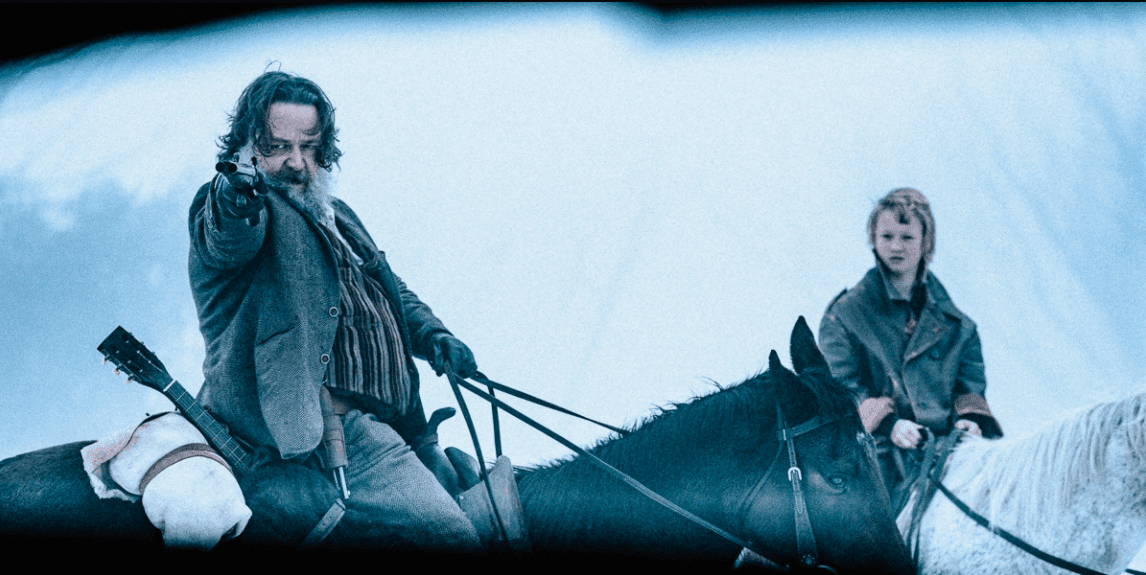
Looking for redemption after his disastrous outing into adapting video games with 2016’s Assassin’s Creed, director Justin Kurzel finds it in an adaptation of an Australian folk legend with True History of the Kelly Gang.
Based on the novel of the same name by Peter Carey, it basically recounts the life and struggles of Ned Kelly (George MacKay). Facing a life of poverty and disgrace as a young boy (Orlando Schwerdt), Ned constantly wrestles with the lack of control he has in his life, as his area is controlled by British soldiers that take advantage of their power. With his mother (Essie Davis) trying to take care of her children and prepare them for the cruel world that surrounds them all while dealing with men around him that attempt to make him as cruel and dominating as they are, Ned grows into adulthood trying to find his place in the world. Eventually, his frustrations form into a rebellion set to shift the power and create a new name for the Kelly family in history.
Just moments into the film, the cinematography and look of the 1860’s Australian landscape immediately reminded me of another Australian based film as well as one of my favorite films of last year: Jennifer Kent’s The Nightingale. Ari Wegner’s cinematography definitely creates a rise-from-the-dirt story visually with how gritty and grimy the film can be. At times, it almost looks like they’re living in the aftermath of a wildfire with how covered in darkness and completely desolate the landscape is. The film’s look makes it so the lines between the poverty-stricken Kelly family and the Brits that are in control are clear and it builds up Ned’s rising feelings of rebellion really well.
One of the film’s big draws, however, was seeing a performance from MacKay post-1917 and he doesn’t disappoint. Once the film turns from Kelly’s life as a young boy, where Schwerdt puts in an incredibly strong performance, it’s really MacKay’s show and he thrives throughout each scene. He really brings out the emotional turmoil building within Ned as his hatred for the Brits grows and he struggles to fit the “man” mold that others have tried to instill in him throughout his young life. When he finally breaks and the Kelly gang forms, he becomes this brutal force to be reckoned with, a vicious, rebellious spirit. Even when Ned eventually becomes obsessed with creating his army and writing his own history to his future kin, MacKay never forgets to bring out his human struggle and care for his family and it’s what ultimately makes the difference in allowing viewers to connect to Ned.
There are also some strong supporting performances. From Charlie Hunnam as the twisted Sergeant O’Neil (who terrorizes the Kelly family and makes Ned ashamed of his father for keeping a red dress) to Russell Crowe as Harry Power (an outlaw who seems innocent and well-mannered but is quickly revealed to not be), these strong, but small performances help build on who Ned becomes. Nicolaus Hoult also brings one of the most vicious and vile performances of his career as Constable Fitzpatrick, as he becomes the true spark in Ned’s turn and a perfectly fitting rival. However, the best performance and strongest influence on Ned really comes from Essie Davis as Ned’s mother, Ellen, as her strong will and resilience create this fire within Ned that makes him obsessed with making her proud.
Ned’s story is an underdog story as he constantly wrestles with how other people try to instill a sense of “manhood” into him and control his future. Frankly, though, I often wondered throughout the film where things were going and the significance of things because it can be a little too subtle. It’s almost too easy to peg the first two acts as a typical arthouse bore with how it speeds through many relationships–like Ned and Henry Powers–and moves so slow that the story direction seems completely aimless. Even the way that Kurzel and writer Shaun Grant attempt to bring out Ned’s bisexuality through his gang wearing dresses and his very sensual relationship with his friend Joe (Sean Keenan) lacks the detail to make things clear and leaves too much room to assume things about Ned.
However, where the first two acts are a slow tread through Ned’s hatred of the Victorian police and the toxic male figures that constantly revolve in and out of his life, the final act is most satisfying because you actually see everything that’s been built come together. Seeing the Kelly Gang and Ned wanting to take action feels very powerful and these rebellious feelings sort of awaken the film. While the actions and the gang’s crimes are unfortunately not as detailed as everything in the first two acts, the finale is incredibly satisfying and kind of like seeing a local legend come to life. The scene of Ned putting on his makeshift armor and taking on Victorian troops on his own is truly legendary and it’s satisfying because of how Ned’s struggles have grown on you as a viewer.
With The True History of the Kelly Gang, Kurzel certainly finds redemption in bringing Ned’s story to life. While certain elements of the first two acts and of Ned as a whole still miss the mark, many viewers will still find themselves engaged by the true underdog story of an Australian legend.

